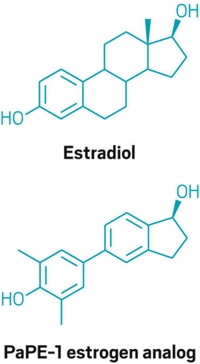Advertisement
Grab your lab coat. Let's get started
Welcome!
Welcome!
Create an account below to get 6 C&EN articles per month, receive newsletters and more - all free.
It seems this is your first time logging in online. Please enter the following information to continue.
As an ACS member you automatically get access to this site. All we need is few more details to create your reading experience.
Not you? Sign in with a different account.
Not you? Sign in with a different account.
ERROR 1
ERROR 1
ERROR 2
ERROR 2
ERROR 2
ERROR 2
ERROR 2
Password and Confirm password must match.
If you have an ACS member number, please enter it here so we can link this account to your membership. (optional)
ERROR 2
ACS values your privacy. By submitting your information, you are gaining access to C&EN and subscribing to our weekly newsletter. We use the information you provide to make your reading experience better, and we will never sell your data to third party members.
Biological Chemistry
Serotonin Regulates Lactation
Neurotransmitter prevents overproduction of milk prior to nursing
by Sophie L. Rovner
October 16, 2007
A new study reports that the neurotransmitter serotonin, which is produced in the brain and intestinal tract, is also produced in human mammary glands, where it controls milk production and secretion (Proc. Natl. Acad. Sci. USA, DOI: 10.1073/pnas.0708136104).
Studies with human mammary cells and with mice show that the concentration of serotonin builds up in mammary glands as they fill with milk. The increase in serotonin inhibits further milk synthesis and secretion by suppressing expression of milk protein genes, according to Nelson D. Horseman, professor of molecular and cellular physiology at the University of Cincinnati, and colleagues. After nursing, the cycle of milk and serotonin production begins again.
The researchers note that the presence of so-called serotonin reuptake proteins in mammary cells "raises the possibility that selective serotonin reuptake inhibitors," which are used to treat depression, "could have effects on the breast or milk."
The researchers add that their findings could be used to develop new methods to enhance milk production in the dairy industry.




Join the conversation
Contact the reporter
Submit a Letter to the Editor for publication
Engage with us on Twitter